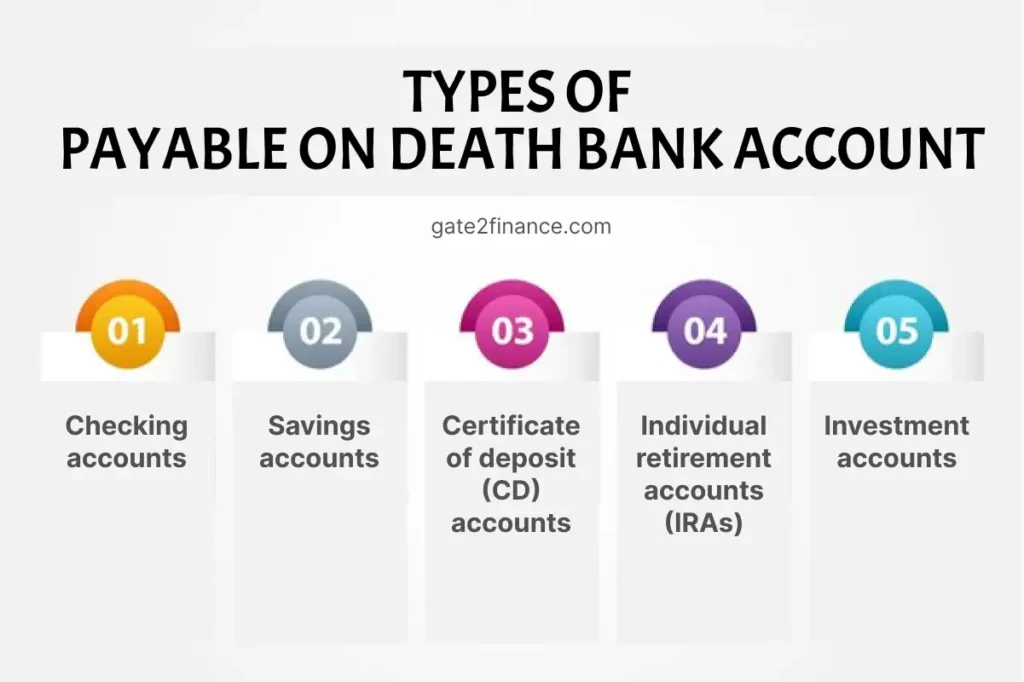What Is a Payable on Death (POD) Account ?
A payable-on-death bank account allows you to designate beneficiaries who will receive funds upon your death. Possessing a Payable on Death account makes it easier to transfer your bank holdings to the people you want after death because the cash travel directly to them rather than being held up in a lengthy divorce process.
whereas not every bank accounts must go through probate (especially if the amounts are low), having a Payable on Death account makes sure your dependents have quick and easy access to the cash in your bank accounts. This is especially crucial if the funds will be needed to cover funeral expenses, which are generally borne by family members.
Payable on Death accounts are attractive since they are free to set up and do not necessitate the assistance of an attorney. However, they are not intended to replace a living trust or a will. Payable on Death accounts are less flexible and offer less protections for beneficiaries compared to revocable living trusts. However, they can address simple financial circumstances like as transferring bank account assets.
How Does a Payable on Death Bank Account Work?
A Payable on Death account permits you to specify a number of beneficiaries. Individuals, groups of people with disabilities, nonprofits, enterprises, organisations, or trusts can all benefit from PODs. However, you cannot name the owner or a co-owner of your bank account as a beneficiary.
The number of Payable on Death recipients you can put on an account is unlimited, and in numerous states, every beneficiary is entitled to an equal amount. For instance, if you’ve got $10,000 in a Payable on Death account and two beneficiaries, both will receive $5,000. If one of the recipients dies before you, the surviving recipient will receive $10,000.
To receive the sum of money, the beneficiary must provide the bank a death certificate, personal identity, and an individual’s letter of instruction. No third parties, such as trustees or lawyers, are required.
What types of accounts can be POD accounts?

You can add Payable on Death beneficiaries to the following sorts of financial accounts:
1. Checking accounts
A checking account is a type of deposit account which enables you to effortlessly withdraw, deposit, and transfer funds. Checking accounts, also known as demand or transactional accounts, can be accessed through a variety of means, including cheques, automated teller machines (ATMs), and digital debit. They are commonly used to save money for short-term costs.
2. Savings accounts
A savings account is a deposit account with interest held by a bank or another financial organisation. Though these accounts normally yield only a moderate interest rate, their security and dependability make them an excellent choice for storing cash for short-term use. Savings accounts provide flexibility and are ideal for building a reserve for emergencies, saving for a short-term objective like a car or vacation, or storing excess cash in a checking account to earn interest. However, withdrawals may be limited.
3. Certificate of deposit (CD) accounts
In the United States, a certificate of deposit (CD) is a time deposit sold by banks, thrift organisations, and credit unions. CDs differ from savings accounts in that they have a particular, limited term before cash can be transferred without penalty and typically have greater interest rates. The bank anticipates that the CDs will be held until maturity, at which point they will be withdrawn and the interest paid. CDs are insured in the United States by the FDIC (Federal Deposit Insurance Corporation) for banks and the National Credit Union Administration (NCUA) for credit unions.
4. Individual retirement accounts (IRAs)
Individual retirement accounts (IRAs) are long-term savings accounts that people with income from employment can use to invest for the future while receiving certain tax breaks. The IRA is primarily intended for self-employed individuals who do not have access to employment retirement plans such as the 401(k), which are exclusively available through employers. You can open an IRA with a bank, an investing firm, an internet-based brokerage, or an individual broker.
5. Investment accounts
Investment accounts include stocks, bonds, funds, and other securities, in addition to cash. The value of goods in an investment account varies and can even drop, which distinguishes it from a bank account. In return for the risk of loss, investment typically provide the possibility for higher reward, particularly over time. As a result, funds held in an investing account are frequently utilised to achieve long-term financial goals, such as saving for pension or college. In reality, it is not unusual to have multiple investing accounts, each utilised to help achieve a certain financial goal.
How to set up a POD Bank Account
You can specify any number of beneficiaries, including individuals, trusts, non-profits, charitable organisations, and businesses. Prepare the following information before visiting your bank:
- You will need an individual’s entire legal name, date of birth, address, and their Social Security number.
- For other entities, you will need the organization’s full legal name, taxpayer identification number, and location.
- Your beneficiary must complete a Totten Trust form in order to authorise your bank to open the Payable on Death account and name them as the beneficiary.
You may also be possible to set up Payable on Death accounts online; check with your financial provider. After converting your traditional accounts to payable on death accounts, you can still add or withdraw funds, or even cancel the accounts completely. You do not need your beneficiary’s permission to make any of these modifications because you are the sole legal ownership and administrator of the account.
Advantages of POD Bank Accounts
- There are no monetary constraints.Regardless of how much money is in your bank account at the moment of death, your beneficiaries are normally free to withdraw any amount they want. However, heirs are still required to pay inheritance taxes.
- It’s free to start up.To open a Payable on Death account, simply call your bank and provide basic information about those who will benefit from it. You usually don’t require an estate preparation attorney.
- Only basic information is necessary.To nominate an individual as a beneficiary, simply supply their name, address, date of birth, country of residence, and a Social Security number (SSN) or Tax Identification Number. To specify an entity, include its legal name, address, and SSN or TIN.
- The assets of banks are not in need of probate. Payable on Death accounts are a contract, thus your possessions are not in danger of a will or probate proceedings. This ensures that your assets are handed to your beneficiaries promptly and efficiently.
- It pays more quickly than a life policy of insurance.Beneficiaries need just produce a death certificate and a beneficiary’s letter of instructions to receive monies immediately. Life insurance policies may take a maximum of sixty days to pay out.
- Can change beneficiaries.You can change or delete beneficiaries from your Payable on Death accounts at any point in time.
Disadvantages of POD Bank Accounts
- Limited to specified account types.Payable on Death beneficiaries are limited to being assigned to certain types of savings and investment accounts. They are not an alternative for a living will, which directs how other assets, such as real estate, should be dispersed.
- Payable on Death accounts generally supersede wills and trusts.Make sure your Payable on Death account does not contradict your wishes. If you leave money in a POD account for Jane but neglect to leave this account for John in the will, Jane will most likely receive the funds.
- Certain tax tactics may be forfeited while using Payable on Death accounts.If you have a high net worth and use credit shelter trusts, marriage trusts, or generation-skipping trusts, and transferring property with a POD could result in a loss of tax benefits for your heirs.
- Lenders may still have rights on Payable on Death assets.Having a Payable on Death does not protect your bank assets from unsecured creditors, particularly if your probate assets are insufficient to meet the debts after death.
- Funds may run up before death.If your bank account is exhausted before you die owing to illness or other costs, your heirs may suffer an unanticipated loss.
- Beneficiaries might die before you.If you die without a living trust, your Payable on Death possessions will go through probate.








